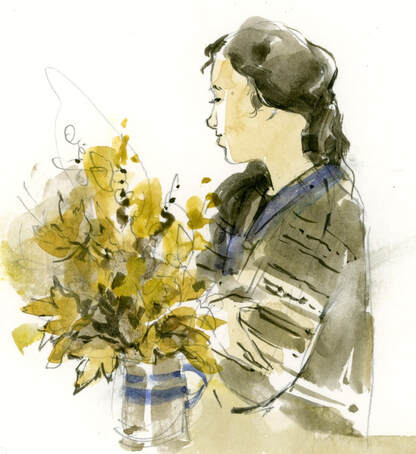Playing Hooky
By Will Musgrove
October 15, 2022
October 15, 2022
Finches chirp in a tree, and I think of my old buddy Jack, about that time we played hooky. We’d borrowed each other’s symptoms, took turns coughing and moaning into the phone. Each call ended with: “I don’t think I’ll make it in today.” Free, we reclined shirtless in Jack’s basement and stared at the ceiling, searching for constellations inside the popcorn spackle.
Jack drew a tiger with his finger. I didn’t see it, didn’t see anything but the surface of a barren moon. An hour passed. Two. Jack’s air conditioner was on the fritz, and I could almost feel the heat licking the sweat from my pores.
“Let’s do something,” I said, sitting up.
Jack outlined something new in the spackle but didn’t say what. His finger drifted like a listless bird.
“I mean it,” I said, nudging him with the edge of my heel. “Let’s do something we’ve never done before.”
“Like what?”
I tugged my t-shirt back on, the fabric sticking to my skin. Pacing, life got in the way. We lived in Podunk. We lacked funds. Then tires screeched. Honking. The highway outside sparked inspiration.
“I’ve never ridden a bus.”
After promising to buy him a sixer of Budweiser, Jack stood and stretched like a waking dog. He threw on a clean shirt, and off we went. In the sun, we walked with our eyes half open, waiting for our pupils to adjust. It was the early afternoon, so no one else was at the bus stop. We sat on the wooden bench, and Jack read me the advertisements lining the shelter’s walls while I watched the glistening, gray road.
The bus rounded the corner and grew and grew until stopping in front of us. The doors hissed open. Climbing aboard felt like being swallowed by a giant, mechanical snake. We paid the fare, took a seat in the back, and the bus revved forward.
The passengers, including Jack and me, bounced like cargo as the bus, seemingly indestructible, cruised over potholes. The city appeared different higher up, like as long as I stayed on the bus I was an observer and not a participant. Inside, I controlled where I got off, where I belonged.
We circled the route over and over, the bus driver eyeing us in the rear-view mirror. Jack slept. His head vibrated against dirty tempered glass. When we zoomed by the stop near Jack’s house, I’d focus on the grooved aisle cutting the bus in two.
During our fourth trip around, a couple of students got on outside the library. They flung their weighted backpacks onto the vinyl seats a few rows ahead of us, and I was a kid again, pretending to be sick as action figures erased my little worries.
The bus jerked, waking Jack. He glanced around like he wasn’t sure where he was before resting his head again against the window.
“Hey,” he said, pointing at the students. “What’s the first thing you remember wanting to be?”
I was eight. I’d told my mom my stomach hurt, that my throat was sore. She tucked me in and went to work. When I heard her car pull out of the driveway, I snuck into the living room and turned on the television. A talent show flickered on. On a stage, a man sang a pop song, his lips kissing a microphone. When he finished, everyone clapped. Everyone cheered.
“A singer.”
“I’ve never heard you hum a bar.”
“Because I’m not any good.”
We came up on a gas station. Jack yanked the dangling cord, and a ding rang throughout. The bus parked on the shoulder. Jack stood. He gestured to me to come on. We departed, my hands smacking the backs of the bus’s seats, not wanting to go, and stepped again into the oppressive heat.
I followed Jack into the gas station and bought him his beer. I followed him down the block and into an empty alley. There he flattened a cardboard box he’d found behind a dumpster and positioned me at its center.
“Sing,” he said, cracking one of the beers. “Do something you’ve never done before.”
Part of me, the part we’re all forced to leave behind in some way at some point, was still on the bus, so I refused. I swiped a beer and ran the cold can across my forehead, biting my bottom lip to keep my mouth closed off from song.
The next day we went to work and the day after that until we’d strung together a timeline of punching in and punching out. A year or so later, Jack headed west, said he had a buddy out there. I never saw him again, never rode the bus again.
Chirp, chirp.
I climb the tree. The finches scatter upward, vanish into the blue, but some return. Some land and perch on the upper branches to continue their song. When they sing, I try to sing, too. Maybe, wherever he is, Jack will hear.
Jack drew a tiger with his finger. I didn’t see it, didn’t see anything but the surface of a barren moon. An hour passed. Two. Jack’s air conditioner was on the fritz, and I could almost feel the heat licking the sweat from my pores.
“Let’s do something,” I said, sitting up.
Jack outlined something new in the spackle but didn’t say what. His finger drifted like a listless bird.
“I mean it,” I said, nudging him with the edge of my heel. “Let’s do something we’ve never done before.”
“Like what?”
I tugged my t-shirt back on, the fabric sticking to my skin. Pacing, life got in the way. We lived in Podunk. We lacked funds. Then tires screeched. Honking. The highway outside sparked inspiration.
“I’ve never ridden a bus.”
After promising to buy him a sixer of Budweiser, Jack stood and stretched like a waking dog. He threw on a clean shirt, and off we went. In the sun, we walked with our eyes half open, waiting for our pupils to adjust. It was the early afternoon, so no one else was at the bus stop. We sat on the wooden bench, and Jack read me the advertisements lining the shelter’s walls while I watched the glistening, gray road.
The bus rounded the corner and grew and grew until stopping in front of us. The doors hissed open. Climbing aboard felt like being swallowed by a giant, mechanical snake. We paid the fare, took a seat in the back, and the bus revved forward.
The passengers, including Jack and me, bounced like cargo as the bus, seemingly indestructible, cruised over potholes. The city appeared different higher up, like as long as I stayed on the bus I was an observer and not a participant. Inside, I controlled where I got off, where I belonged.
We circled the route over and over, the bus driver eyeing us in the rear-view mirror. Jack slept. His head vibrated against dirty tempered glass. When we zoomed by the stop near Jack’s house, I’d focus on the grooved aisle cutting the bus in two.
During our fourth trip around, a couple of students got on outside the library. They flung their weighted backpacks onto the vinyl seats a few rows ahead of us, and I was a kid again, pretending to be sick as action figures erased my little worries.
The bus jerked, waking Jack. He glanced around like he wasn’t sure where he was before resting his head again against the window.
“Hey,” he said, pointing at the students. “What’s the first thing you remember wanting to be?”
I was eight. I’d told my mom my stomach hurt, that my throat was sore. She tucked me in and went to work. When I heard her car pull out of the driveway, I snuck into the living room and turned on the television. A talent show flickered on. On a stage, a man sang a pop song, his lips kissing a microphone. When he finished, everyone clapped. Everyone cheered.
“A singer.”
“I’ve never heard you hum a bar.”
“Because I’m not any good.”
We came up on a gas station. Jack yanked the dangling cord, and a ding rang throughout. The bus parked on the shoulder. Jack stood. He gestured to me to come on. We departed, my hands smacking the backs of the bus’s seats, not wanting to go, and stepped again into the oppressive heat.
I followed Jack into the gas station and bought him his beer. I followed him down the block and into an empty alley. There he flattened a cardboard box he’d found behind a dumpster and positioned me at its center.
“Sing,” he said, cracking one of the beers. “Do something you’ve never done before.”
Part of me, the part we’re all forced to leave behind in some way at some point, was still on the bus, so I refused. I swiped a beer and ran the cold can across my forehead, biting my bottom lip to keep my mouth closed off from song.
The next day we went to work and the day after that until we’d strung together a timeline of punching in and punching out. A year or so later, Jack headed west, said he had a buddy out there. I never saw him again, never rode the bus again.
Chirp, chirp.
I climb the tree. The finches scatter upward, vanish into the blue, but some return. Some land and perch on the upper branches to continue their song. When they sing, I try to sing, too. Maybe, wherever he is, Jack will hear.
Will Musgrove is a writer and journalist from Northwest Iowa. He received an MFA from Minnesota State University, Mankato. His work has appeared or is forthcoming in TIMBER, The McNeese Review, Oyez Review, Tampa Review, Vestal Review, and elsewhere. Connect on Twitter at @Will_Musgrove or williammusgrove.com.

